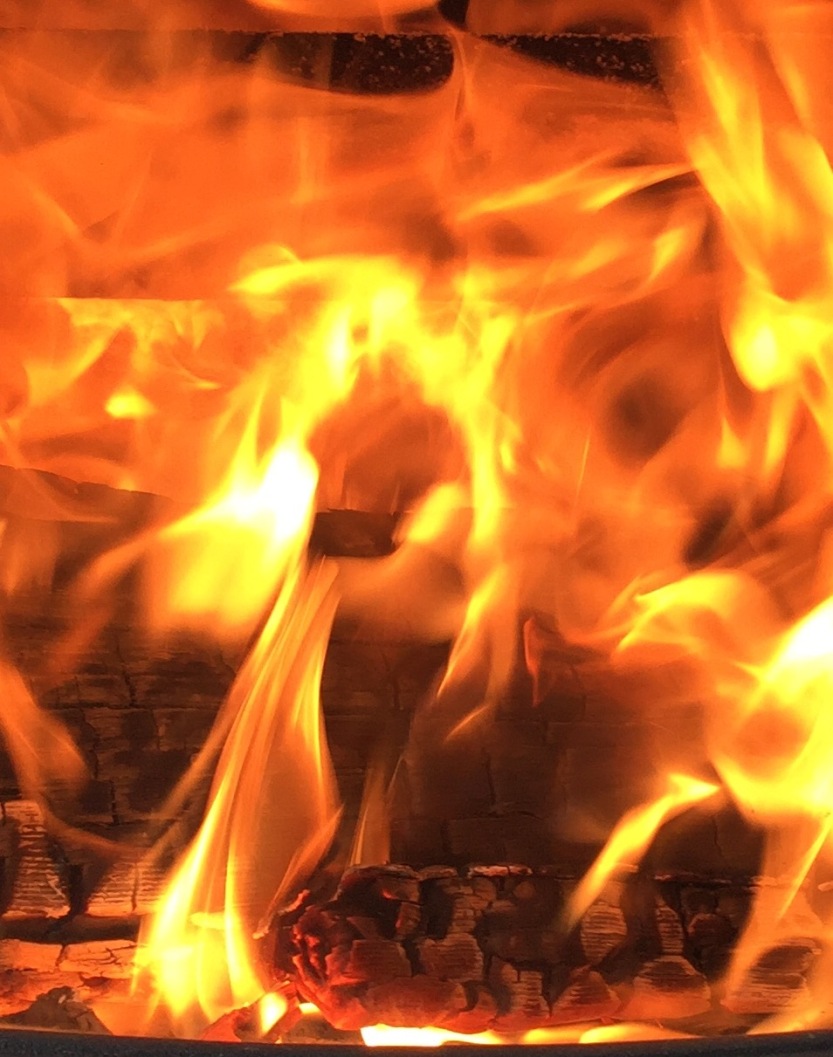Lisa Radhika Kaul
He huddled next to his mother in the kitchen, trying to burrow under her pheran. Boys weren’t supposed to be in the kitchen. It was a woman’s place. He was six, but he already knew about geometry and hierarchy. That didn’t mean he either agreed with, or followed their rules. His mother crouched, blew into the fire, the transparency of her skin luminous in the flames. Although her belly was swollen again, she felt a fierce tenderness towards this third child of hers. He was neither the child of her youth nor of her old age. But for now, he was the youngest and clung to her with the same tenacity that he ran wild with. So although she was uncomfortable and busy, she turned to look at him. Her son had yet to acquire a socially appropriate way of meeting another’s gaze. His eyes, the color of cinnamon, chocolate, and coffee, seemed to leap out of his face like flames that pierced, took apart, and then pieced together everything that they beheld. They enticed and engulfed. They sparkled brighter and clearer than the valley in a full moon after a fresh powdering of snow.

But that day meteors of glee flickered in his eyes. She knew intuitively that he was looking for a hiding place. What had he gotten himself into today? Had his father caught him playing with the boy whose breath reeked of onion and garlic? Had he given the washer-woman a drink in a glass that was meant only for the use of the household? Had he answered all the math problems that were meant for his older brother, who couldn’t? Had he been able to decipher the words that his older sister had been struggling with in her English reader? Had he dangled a spider over the learned tutor who tried, in vain, to educate his older siblings?
As she tried to make room for him, and her belly, under the pheran, her husband appeared at the doorway. He was clearly rattled, his usually erect composure awry. She, a true Kashmiri battini, was no pushover. Four feet, eight inches, in her perpetually stockinged feet she balanced the six muscular feet of her husband, the doctor. He was punctilious and fastidious. He always took his tea at 4p.m., preferably in the company of the English mems, and served in porcelain cups. She drank kahva or sheir chai depending on what kind of antidote her afternoon meal required. She sat on the carpeted floor, with her chin propped on her knees, and thoughtfully dipped a katlam or kulcha into her tea, which she always drank from a brass khos wrapped in a towel. He preferred black tea, Marie biscuits and conversation in English. However, try as he might, he couldn’t rescind his habit of dipping the crunchy biscuit into the steaming liquid. Fortunately, his foreign ladies were partial to this experiment in dissolution, and were always charmed by any failure.
“Do you know what your son did today?” It was clear that when her husband referred to their male offspring as being of single parentage, he was speaking only of her third born. “He … he … the son of a Brahmin… I found him… He was eating …” The Doctor sputtered and stuttered. He couldn’t find the words to express his anger, his horror, his distaste and his anguish. “B’Tangwol. In the hatoo beef-eaters house!”
The boy felt his mother’s body stiffen. She might have held her friend Sakeena’s hand in labor, but she had never let Sakeena’s shadow so much as cross the threshold of her kitchen. She might have let her husband drink out of porcelain cups, but no egg had ever found its way into her kitchen. And here, nestled in the crook of her arm, right in the heart of her kitchen was her own flesh and blood who had eaten with, and maybe, hai! hai! and here she crossed her hands over her breasts and tugged her ear-lobes while sticking out her tongue, partaken of the nameless. How was she to atone for such a transgression? How could she cleanse her son? Purifying the hearth and her self was a simple matter. She would have to throw away whatever had been cooked. And then a fresh layer of clay, and a cold bath would suffice. But what was she to do with her son and his wondrous eyes? Why couldn’t he have just looked?
Yet even though she flinched from her son’s contaminating touch, she could not bear to hand him over to her irate husband, who being a man of science could not gauge the imperceptible twitch of his wife’s muscles from his perch in the doorway. Unlike him, his son was finely tuned to every tic and pulse of his mother’s skin. He sensed her withdrawal, and was outraged at her ambivalence. Spurred by her betrayal, he charged out of the sanctuary that she had been trying to provide and stated, insouciantly, “The food was sakht jaan.”
As the words of that pronouncement crystallized into a thousand sharpened icicles in the frigid atmosphere of the room, the boy attempted to flee. But he was no match for the bulk of his father who was blocking the only exit.

He was trapped and subjected to the standard treatment that had routinely been his lot. The first brush of the switch always sounded like the rustling of autumnal leaves and seemed like a joke. But the father had a plan. The punishment was light, but lingered smoldering, waiting to burst. The father knew that later, when the boy would be tempted to forget, the oils from the switch would erupt into a thousand angry blisters on the boy’s skin. A few would weep, and every one of them would burn into the boy’s consciousness.
The father did not bear any malice towards his son. Neither was he a cruel man. However, he was bound by the promise of the janeu that he so solemnly and unfailingly cast upon himself every morning to uphold the tradition. He was merely doing what he thought was expected of him. But he underestimated his son. Or maybe he just didn’t know him. He and the boy have already had several such brushes, but the boy had an infinite capacity to forget the pain. What he did remember was to be true to himself. It was not in his nature to follow or to obey, or to do as he was told. He danced to a tune that only he could hear, and of which he was the solitary scribe.
His mother winced with pain as each treacherous leaf tattooed her son’s sensitive skin. She wished he would cry, or admit that he was wrong. At the same time, she couldn’t ignore the swell of her heart as she silently championed his stubbornness. His birth had not been easy. She had been marooned in the snowbound Skardu valley surrounded by magnificent peaks – all of which made the trek back to her own native Srinagar impossible. She had been alone, albeit with a doctor in the house, but that was of little consequence or consolation to her. Isolated and despondent, she longed to be amongst her people who had begun preparation for the three-week long festival of Shivratri, that went under the misnomer of “the night of Shiva.” However, her child seemed reluctant to exchange his watery abode for a frozen one. Unsteady on her feet, she had been struggling to oversee the initial preparations when on the 13th day- the night of the celestial nuptials of Shiva and Parvati- he had decided, in one fell swoop, to emerge. There was no doubt that this was a most auspicious time to make an appearance. But, as a mother, she had worried that the temperamental Shiva might not look kindly upon this division of attention. Perhaps this was the source of her son’s stubbornness?
Twenty-four hours later when the blisters and itching were scheduled to erupt, the boy’s skin remained unblemished. She sighed in relief and remembered that her people, unlike the Hindus of the plains, had christened her son’s time of birth as Herath (miraculous surprise), rather than Shivratri. Legend had it that an autocratic Pathan ruler had insisted that the Kashmiri pandits celebrate their cherished festival of Shivratri in the warmer months of June-July, instead of the snowy Phalgun. The pandits had no choice but to obey. However, that year, Mother Nature unleashed a snowstorm on the night of Shivratri, wrecking havoc on the crops and ultimately causing much financial distress to the Pathan ruler, who had no choice but to rescind his decree.
The boy did not shed a tear of remorse. He saw no wrong in what he had done. Why could he not partake of Ali’s food? Was Ali not a boy just like he? So what if he was Muslim? She sighed again. But this time with resigned pride: her son knew the secret to creating miracles.

Glossary
Battini: Kashmiri Hindu woman
B’Tangwol: By the Tonga (horse/donkey driven carriage) driver.
Hai!hai!: Plaintive cry to express anguish.
Hatoo: Pejorative used for Muslims.
Herath: Persian for “miraculous surprise.”
Janeu: Sacred thread.
Kahva: Tea made with cardamom and almonds. Served without milk.
Katlam: Flaky bread; similar to puff pastry
Khos: bronze cup
Kulcha: dry, crunchy, round bread; often salty
Mem: shortened for memsahib, word used to denote the lady wives of the English.
Pandit: exonym for Kashmiri Hindus
Pheran: loose tunic
Sakht jaan: very nice.
Sheir chai: Or noon chai; salty, tea beverage, pink in color.
All text and photographs © Lisa Radhika Kaul and humble puddle.com, 2016. Unauthorized use and/or duplication of this material without express and written permission from this site’s author and/or owner is strictly prohibited. Excerpts and links may be used, provided that full and clear credit is given to Lisa Radhika Kaul and humble puddle.com with appropriate and specific direction to the original content.

Lisa, What a beautifully written story. It seems to me to be an episode in a novel. I will hope for the whole thing. L
LikeLike
Thanks, Aunt L! How do you always know the gantze mayse in advance?
LikeLike
Utterly lyrical and lovely Lisa ! Congratulations on becoming such a sensitive writer.
LikeLike
Thanks so much! Means a lot coming from you!
LikeLike
Beautifully written!
LikeLike
Thanks, Sonia!
LikeLike
beautifully narrated….loved reading this Lisa.
LikeLike
Thank you so much! Hope I didn’t get all the facts wrong! Next time, I’ll run them by you!
LikeLike
Beautiful. A really lovely tribute for today. I am looking forward to more. Thank you for the glossary- I did not expect “very nice” and had to go back!
LikeLike
Thanks, Anna! Glossary was just for YOU, although “very nice” was a bit of an understatement.
LikeLike
You have a great talent, Radhika. Eager to read more.
LikeLike
I’m humbled! Thank you!
LikeLike
Sakht jaan Lisa.
LikeLike
Ha! Ha! Thank you!
LikeLike
What a beautifully written piece Lisa! I look forward to more, definitely as part of an acclaimed novel.
LikeLike
Thanks, Monaz! Hmm. I’ve toyed with the idea …… Maybe it’ll turn into something!
LikeLike
Beautifully written. Words just flowing from the heart. Photography just awesome.
Viru we all miss u a lot.
Lisa a big hug
Lillian
LikeLike
Thank you so much!
LikeLike
Wah Lisa! I felt I was there…
LikeLike
Thank you, Bella rani!
LikeLike
I read this for the third time and still like it. Really, this is unfortunate for you. You’ll have to write more.
LikeLike
Careful, what you wish for!
LikeLike
waiting for more posts
LikeLike
It’s on! “List No More!” Happy reading!
LikeLike